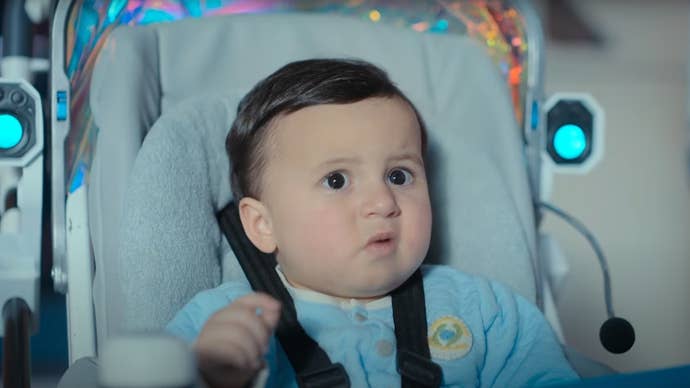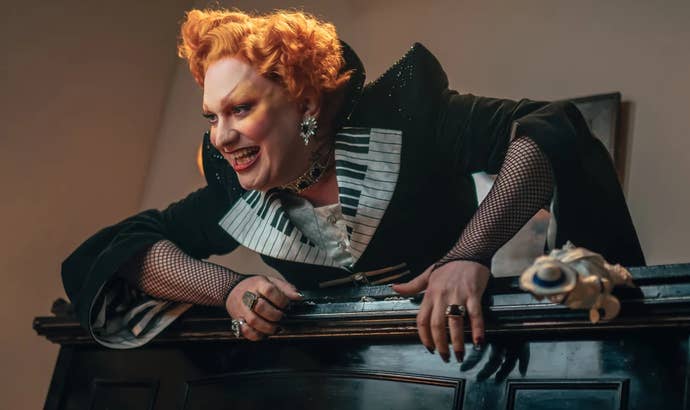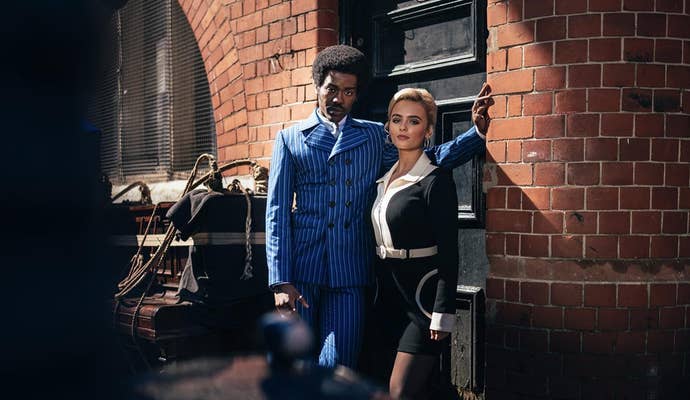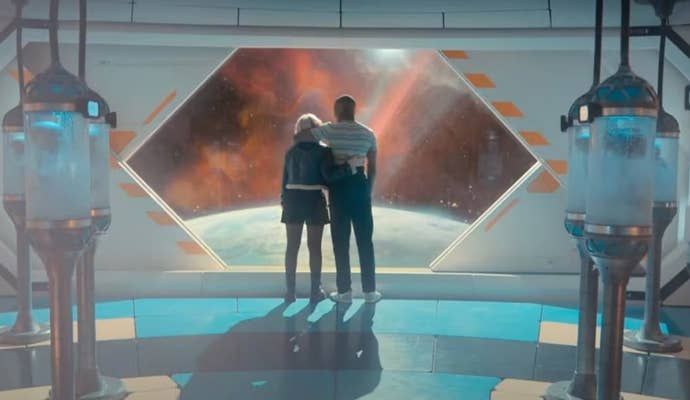Products You May Like
It could so easily have been that last year’s specials starring David Tennant were merely a victory lap for his era. A celebration of the revived show at the height of its power, with everyone’s favourite and arguably most dashing Doctor to have ever served in the role, coming back for one last reminder of why we all fell in love with the series in the first place, farting aliens and all.
Thankfully, they were just the start of RTD’s second wind as Whovian-in-Chief. And what a statement of intent: yes, this is the show as you remember it. Vibrant. Gleaming. Brimming with all the chaotic energy of Ant & Dec’s Saturday Night Takeaway and shot through with all the warmth and world-weary empathy of Davies’ other, more serious works, with a sixth sense for casting (bolstered by longtime collaborator Andy Pryor) that other showrunners would kill for. Being able to summon Neil Patrick Harris to Bristol to play the Celestial Toymaker is testament to RTD’s Time Lord-like powers as a producer, and positioning him as a dark mirror for David Tennant is divine genius.
But this is also a new era of Doctor Who, future-proofed for Gen Alpha and reinventing itself for a jaded age that desperately needs new myths. Ncuti Gatwa is so far from the “classic” image of The Doctor – he’s not a middle-aged white man, obviously, but that’s not why. He’s effortlessly cool, rocking an ever-changing wardrobe and grooming regimen that no previous Doc could pull off. I mean, he even managed to look stylish during his debut episode, which he spent in a shirt and underpants. There’s nothing stuffy or superior about him at all – he brims with the essence of creativity and invention. If all the previous Doctors are Phil Collins, he’s Prince, and he can do anything.
He’s also managed to cut through my built-in aversion to accents from the east coast of Scotland, where I grew up. Hearing anyone who sounds remotely like me or the people I grew up with on the telly is usually like nails on a chalkboard, but Ncuti’s decision to use his natural accent – Fife with just the slightest hint of a Rwandan upbringing – works massively in his favour. The Doctor should be at once familiar but also difficult to pin down on details. Lots of planets have a Dunfermline, after all.

And so he bounces around on screen with the cadence of a man determined to make every moment count, who can feel each second as it slips by. There is so much movement in this show, it’s mesmerising, fizzing and popping with delightful intent. A sharp contrast to the show under RTD’s successors and/or predecessors, which felt glacially slow in comparison. Each showrunner was trying to make their own mark. Moffatt tried to turn it into a grand, twisting science fiction epic where time travel and the workings thereof wasn’t just a device or premise, but the point of the show. Chibnall tried to give the Tardis a cosy sitcom dynamic while desperately trying to transplant some mystique back into an old and creaking mythology with entire reference books full of established and immovable canonical facts.
RTD, of course, is the trickster god of Doctor Who, and so he changed the series bible by having the Celestial Toymaker’s return fundamentally rewrite it, giving licence to do things that Doctor Who genuinely hasn’t done in its sixty-plus years. Goblins in floating pirate ships kidnapping babies. Demons crawling out of pianos and magicing the very concept of music out of humanity’s soul. All the while, still journeying to the edge of the universe to fix spaceships gone awry. The show was always science-fantasy, but the balance is now tweaked in the latter’s favour. And god is it a welcome tweak.

Perhaps the most classically-Who story of season one of 14 or 40 (delete according to preference) is Space Babies. It starts with an intriguing scifi concept: what if a space station were run by super smart infants? Highly intelligent enough to problem solve and operate sophisticated equipment, but still outwardly babyish: incontinent, barely mobile, unable to sleep without being read a bedtime story. Terrorised by a snot monster. The whole thing. What a wonderfully Doctor Who idea. It has shades of Who’s past in that it’s slightly evocative of Tennant-era favourite The Girl in the Fireplace, but is also a showcase of RTD’s famed soft spot for the utterly puerile: the man who brought you burping bins, guffing alien invaders, and paving slab blow jobs is back with more of that. The Doctor finding an affinity with a literal snot monster, then saving the day by pressing engage on a giant farting space arse. My god, people, we are so back.

Back too are on-screen ideas that are a little too ambitious for the visual effects budget, which I would argue is all part of the show’s scrappy appeal, but I’m also convinced that no amount of Disney money could pull off lipsynced babies without any dips into the uncanny valley. The usual tedious sorts of people who whine about bad CGI whenever something on screen reminds them that they are not watching a documentary have always revelled in unenjoying this show, but then they also regularly complain about the VFX in ultrabudget movies whose catering bill would pay for five seasons of Who. Frankly, you can’t please some people. The babies are sweet, and ridiculously endearing.
And then: terror. Davies has written some of the most unsettling episodes of Doctor Who ever, in any era. Turn Left, with its harrowing imagery of a world pivoting to fascism in response to a major disaster. Last year’s Wild Blue Yonder, where Who tried its hand at body horror with frightening results. And Midnight, a single-location episode driven entirely by an all-timer of a script and an ensemble brilliant enough to deliver it flawlessly. This season’s The Devil’s Chord can slot itself neatly into that pantheon: arriving disguised as a goofy historical episode, it purports to be a Beatles-themed adventure in Swinging London but in fact puts The Doctor and the entire human race at the mercy of Maestro, possibly one of the greatest villains to ever debut on the show and played with pitch-perfection by RuPaul’s Drag Race star Jinkx Monsoon. There’s RTD’s eye for casting proving its worth again.

Having a scenery-chewing, fourth wall breaking villain turn up to make fools of your favourites is a dicey prospect for any TV show, particularly one with a fledgling new cast that is yet to properly establish itself. Monsoon’s performance put me in mind of Jesse James Keitel’s turn as a hammy space pirate in Star Trek: Strange New Worlds, which I found irritating and overdone more than endearing, whose entire plan seemed to hinge on the crew becoming complete morons for precisely one episode (although it has to be said I’m massively in the minority on that one).
In contrast, Maestro places The Doctor believably out of his depth. As she’s a daughter of the Toymaker, he knows that he barely survived his previous encounter with her kin, and we see that trauma bubbling to the surface here. It doesn’t undermine him, as it so easily could: it reinforces the peril. RTD is perhaps at his best when he’s giving The Doctor some vulnerability, and that well-practised talent is deployed for full effect here.Thankfully, The Beatles are barely in it. And I think it’s a marvellous meta-marketing twist that they featured so heavily in the show’s promotion, only to turn up as victims of a tyrannical, music-stealing goddess. We hear of John Lennon crying himself to sleep every night from the absence of music as his creative outlet. Paul McCartney pretends to hate songwriting. It’s about as far from the Fab Four as you can get, tonally. A pantomime of misery.

What stops it being a hard watch is the machine-gun pace, and the performances to match. Monsoon and Gatwa fizz around each other with showbiz aplomb, in a dynamic which mirrors that of David Tennant and Neil Patrick Harris – narratively at odds, but equally powerful in their command of the stage. Gatwa who seems to glide around the scene like a Top of the Pops background dancer on rollerskates. Monsoon who gesticulates like an eldritch horror crossed with Liberace, and has an uncanny ability to contort her face into a terrifying, demonic glare without any obvious post-production getting involved. They’re so evenly matched in coolness and weirdness that they cancel each other out, giving Millie Gibson’s Ruby Sunday – here somewhat representing the audience in their baffled mortality – a prime opportunity to tip the balance.
In Ruby’s relationship with The Doctor, we are reminded of Billie Piper’s ferocious chemistry with David Tennant. Gibson is nailing the brief here: playing Ruby with the difficult balance of youthful naivete, intelligence, and agency that the role requires. Time will tell if their relationship will sit among the iconic partnerships that have defined the show over the years, but all the right components are there for it to hit that status. And given that they are blessed with the best showrunner this series has ever had, who seems uniquely capable of giving it the kind of prestige it actually needs and deserves, I have no doubt that by series 14 or 28 or 54 we’ll be wondering if the new lot can possibly compare to the golden age of Gatwa and Gibson.
Here’s to more trickster gods and farting space arses. Thank god for Russell.
